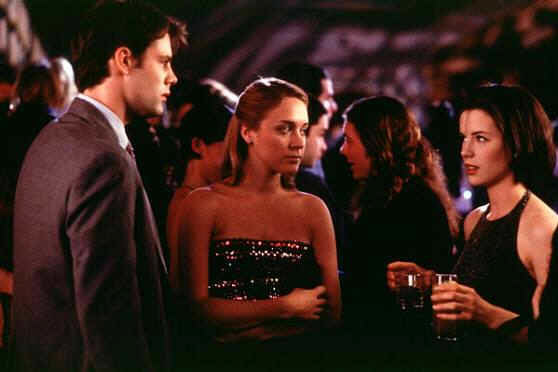The last time I went to a film screening was when I saw Whit Stillman’s The Last Days of Disco prior to its release in 1998. I was writing a profile of Whit for Civilization, part of which eventually made it into the Teachout Reader, and I interviewed him a few weeks later. It turned out to be the last time I saw him in person, for he went abroad to live not long after that, and he made no more films after The Last Days of Disco–until now.
Yesterday afternoon Whit sent me an e-mail from out of the blue asking if I’d like to see Damsels in Distress, his long-awaited fourth film, which opens in New York and Los Angeles on April 6. I wrote back at once saying yes, and a few hours later I was sitting in the front row of a screening room in midtown Manhattan, remembering how it felt to see The Last Days of Disco for the first time fourteen years ago. I felt a brief pang of nostalgia as I thought about the myriad things that have happened to me since then, some wonderful and some terrible, and marveled at how so many years could pass so quickly. Then the lights went down, and within seconds I was caught up in Damsels.
This won’t be a review–that’ll have to wait–but I do want to say that if you’ve been wondering whatever happened to Whit Stillman, the answer is, quite simply, that he got better. Damsels is a poem of innocence, sweet, smart, whimsical, and singularly touching. Like his other films, it won’t suit everybody, and I don’t doubt that a few people will hate every second of it. Not me. I was carried away, and when it was over, I wanted to see it again on the spot.
Here’s a line from Damsels that I scribbled down on the fly, I hope accurately:
I adore optimism, even when it’s absurd–perhaps especially then.
If that speaks to you, so will Damsels in Distress.
* * *
The theatrical trailer for Damsels in Distress:

 Contrary to conventional highbrow wisdom, there are plenty of smart movies being made nowadays: they’re just not being made in Hollywood. Most of the American films I’ve liked best in the past couple of years–Kevin Smith’s Chasing Amy, Doug Liman’s Swingers, Greg Mottola’s The Daytrippers, Daisy von Scherler Mayer’s Party Girl–have been small-scale productions, often shot in and around New York, whose characters spend much of their on-screen time conversing about romance and its discontents. These chatty comedies, which are nothing if not smart, are the product of a youth-oriented urban subculture whose most gifted member, unlikely as it may sound, is 46-year-old Whit Stillman, who writes, directs and produces wonderfully funny movies about the awkward love lives of what one of his characters calls the “urban haute bourgeoisie.”
Contrary to conventional highbrow wisdom, there are plenty of smart movies being made nowadays: they’re just not being made in Hollywood. Most of the American films I’ve liked best in the past couple of years–Kevin Smith’s Chasing Amy, Doug Liman’s Swingers, Greg Mottola’s The Daytrippers, Daisy von Scherler Mayer’s Party Girl–have been small-scale productions, often shot in and around New York, whose characters spend much of their on-screen time conversing about romance and its discontents. These chatty comedies, which are nothing if not smart, are the product of a youth-oriented urban subculture whose most gifted member, unlikely as it may sound, is 46-year-old Whit Stillman, who writes, directs and produces wonderfully funny movies about the awkward love lives of what one of his characters calls the “urban haute bourgeoisie.” The filmmaker lives in a Greenwich Village apartment surrounded by avant-garde art galleries, far from the tony Park Avenue addresses from which most of his characters originally hail (though few of them end up going back there). He was busy doing a last-minute cleanup job on the soundtrack when I visited him, but even though the film’s release date was mere days away, he seemed perfectly happy to take an hour off from his frenzied search for the perfect set of church bells to dub into the climactic scene.
The filmmaker lives in a Greenwich Village apartment surrounded by avant-garde art galleries, far from the tony Park Avenue addresses from which most of his characters originally hail (though few of them end up going back there). He was busy doing a last-minute cleanup job on the soundtrack when I visited him, but even though the film’s release date was mere days away, he seemed perfectly happy to take an hour off from his frenzied search for the perfect set of church bells to dub into the climactic scene.